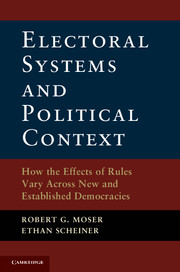 Electoral Systems and Political Context
Electoral Systems and Political Context Book contents
- Frontmatter
- Contents
- Tables and Figures
- Abbreviations
- Glossary of Key Terms
- Acknowledgments and Note on the Online Appendix
- Introduction
- 1 When Do the Effects of Electoral Systems Diverge from Our Expectations?
- 2 Mixed-Member Electoral Systems
- 3 How Democratic Experience and Party System Development Condition the Effects of Electoral Rules on Disproportionality and the Number of Parties
- 4 How Democratic Experience and Party System Development Condition the Effects of Electoral Rules on Disproportionality and the Number of Parties
- 5 Political Context, Electoral Rules, and Their Effects on Strategic and Personal Voting
- 6 How Democratic Experience and Party System Development Condition the Effect of Electoral Rules on Strategic Defection
- 7 Social Diversity, Electoral Rules, and the Number of Parties
- 8 How Political Context Shapes the Effect of Electoral Rules on Women's Representation
- 9 Conclusion
- References
- Index
Introduction
Why Don't Electoral Rules Have the Same Effects in All Countries?
Published online by Cambridge University Press: 05 November 2012
- Frontmatter
- Contents
- Tables and Figures
- Abbreviations
- Glossary of Key Terms
- Acknowledgments and Note on the Online Appendix
- Introduction
- 1 When Do the Effects of Electoral Systems Diverge from Our Expectations?
- 2 Mixed-Member Electoral Systems
- 3 How Democratic Experience and Party System Development Condition the Effects of Electoral Rules on Disproportionality and the Number of Parties
- 4 How Democratic Experience and Party System Development Condition the Effects of Electoral Rules on Disproportionality and the Number of Parties
- 5 Political Context, Electoral Rules, and Their Effects on Strategic and Personal Voting
- 6 How Democratic Experience and Party System Development Condition the Effect of Electoral Rules on Strategic Defection
- 7 Social Diversity, Electoral Rules, and the Number of Parties
- 8 How Political Context Shapes the Effect of Electoral Rules on Women's Representation
- 9 Conclusion
- References
- Index
Summary
In the early 1990s, Japan and Russia each adopted a very similar version of a “mixed-member” electoral system. In the form used in Japan and Russia, in elections to a single house of the legislature each voter cast two ballots: one for a candidate in a single-member district (SMD) and one for a party under proportional representation (PR). In the SMD races, both countries used first-past-the-post (FPTP) rules, meaning that the candidate winning the largest number of votes in the district wins the race, even if tallying under a majority of all the SMD ballots cast. In PR, parties win shares of seats roughly in proportion to their share of the party vote. In both Japan and Russia, the PR systems used closed-list rules, meaning that prior to each election central party leaders put together a rank-ordered list of candidates to determine which individuals would win seats if the party won representation in PR. In PR in both countries, voters were only given the chance to choose a single pre-set party list. Both countries used mixed-member-majoritarian (MMM) electoral systems, meaning that the SMD and PR components of the system were “unlinked” – seats won by a party in one tier (e.g., SMDs) did not affect the number of seats allocated to the party in the other tier (e.g., PR). In short, both Russia and Japan adopted very similar forms of mixed-member electoral systems.
In both countries, it was widely expected that the different rules would promote particular outcomes: The SMD tier was expected to lead to a small number of large, catchall parties, especially at the district level. The PR tier was supposed to promote the proliferation of political parties, greater proportionality, and more female representation – especially when compared with results in the SMD tier.
- Type
- Chapter
- Information
- Electoral Systems and Political ContextHow the Effects of Rules Vary Across New and Established Democracies, pp. 1 - 12Publisher: Cambridge University PressPrint publication year: 2012


